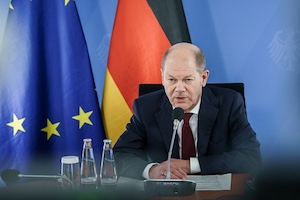German Chancellor Scholz Fails Confidence Vote, Parliament to Be Dissolved for New Elections

On December 16, the German Bundestag voted on a confidence motion for Chancellor Olaf Scholz. Only 207 lawmakers voted in favor of him, while 394 opposed, and 116 abstained. A minimum of 397 votes in favor was needed to pass the confidence motion, meaning Scholz did not secure the vote, and Parliament will be dissolved for new elections. Scholz stated that the real confidence vote should be decided by voters in the upcoming parliamentary elections.
In 2021, Scholz formed a coalition government with three parties: the Social Democratic Party (SPD), led by Scholz; the Green Party, represented by Economy Minister Robert Habeck; and the Free Democratic Party (FDP), led by former Finance Minister Christian Lindner. However, policy differences, especially on economic matters, led to the collapse of the coalition. The SPD and the Greens believed in raising taxes and increasing borrowing, while the FDP advocated for avoiding excessive debt. This disagreement led to the government's downfall. On November 6, Scholz dismissed FDP Finance Minister Lindner, further deepening the rift.
Scholz criticized the FDP for undermining the government and damaging its reputation and that of democracy. He will propose to President Frank-Walter Steinmeier to dissolve Parliament. The President stated he would agree to the request by law and hold new elections within 60 days, expected to take place on February 23, 2025—seven months earlier than the previously scheduled election in September.
The leader of the largest opposition party, the Christian Democratic Union (CDU), Friedrich Merz, criticized Scholz's economic policies, accusing him of "sacrificing the interests of the younger generation to increase debt" and blaming him for plunging Germany into one of its worst post-war economic crises. According to a recent Politico poll, the CDU leads with 32% support, and Merz is seen as a potential new Chancellor. The Alternative for Germany (AfD) party has 19%, while Scholz’s SPD stands at 17%.
- 13 reads
Human Rights
Ringing FOWPAL’s Peace Bell for the World:Nobel Peace Prize Laureates’ Visions and Actions

Protecting the World’s Cultural Diversity for a Sustainable Future

The Peace Bell Resonates at the 27th Eurasian Economic Summit

Declaration of World Day of the Power of Hope Endorsed by People in 158 Nations

Puppet Show I International Friendship Day 2020

